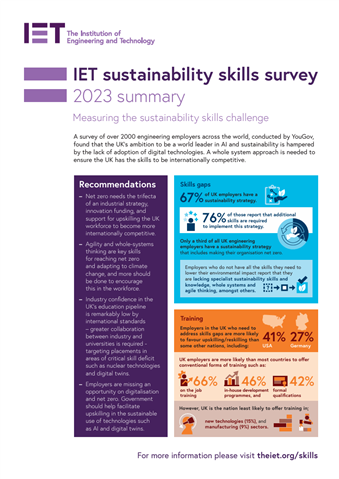When research reveals a trend as worrying as the fact that fewer than 5% of engineering companies from thousands around the world who took part in a recent survey believe they have the skills in place to be resilient to climate change*, it’s probably unfair to pick out how one country perceives the problem.
 The results of the IET’s recent International Green Skills Survey, however, throw up some odd facts about UK industry that bear closer examination and might offer clues about how industry worldwide can respond to the warning that a lack of skills is the most common barrier to achieving net zero carbon emissions.
The results of the IET’s recent International Green Skills Survey, however, throw up some odd facts about UK industry that bear closer examination and might offer clues about how industry worldwide can respond to the warning that a lack of skills is the most common barrier to achieving net zero carbon emissions.
The bottom line, unsurprisingly, is that everyone’s preoccupied with the potential impact of climate change on their business.
In the UK, 65% of respondents say they are ‘concerned’ or ‘very concerned’, about the impact of climate change on their engineering businesses. However, this makes the country an outlier, with a third of engineering businesses – by far the highest proportion from all countries involved in the research – not even concerned about this.
In the global south, there’s almost unanimous agreement with 98% of respondents in China and 91% in Brazil saying they are concerned, and India and Malaysia close behind. These countries are also the least likely to believe they have the skills they need to be resilient to climate change, with 4% or fewer of companies confident they’re prepared. For the UK, that figure is 10%; double the global average and reflecting a mood that the report describes as “if not complacent, then at least at risk of it.”
Attitudes vary too when it comes to identifying the actual skills that organisations think they need to be resilient. In Malaysia, for example, nearly half identify the ability to solve complex problems, whereas Chinese companies are more than twice as likely as their UK counterparts to say that they need digital skills. Technical and engineering skills are the most popular choice in Egypt, while Saudi Arabia and Germany both have whole-systems thinking as their top answer. Numbers aside, it’s clear that opinions are divided on how to achieve resilience to climate change, and that no country sees one skill set in particular as a ‘silver bullet’.
Although, generally, confidence is low on the resilience front, companies do feel, by and large, that their workforces are agile, able to apply their existing skill sets to new situations and adapt to new technologies. The UK stands out again here though, and not in a good way. Nearly 30% of employers feel that their workforce is not agile enough, at least double the majority of almost all other countries.
Whatever industry’s perceptions are about its readiness to tackle the net zero agenda, government policies will play an important role. The survey obtained important data on what companies think the priorities should be in the area of skills.
The most common top answers were to improve policies for the green economy (Malaysia, India and Brazil) or industrial strategy (UK, Egypt and USA). A few countries stand out: Malaysia, for example, where companies had a low opinion of the education system’s ability to prepare young people to enter industry, called for prioritisation of the education pipeline and promotion of green jobs.
With regard to which industries are going to be the most important, mature technologies rather than innovative ones were top of the agenda. Six countries selected new buildings and construction as their most common answer, while China, Brazil and the USA selected renewable energy generation. This suggests that respondents feel the most important technologies to address climate change are already in place, and that we aren’t relying on developing new one.
Many countries are also confident they have the skills they need in these specific, mature areas. Other areas that were frequently highlighted included manufacture of key components such as batteries (China), heating/cooling of buildings (Australia) and carbon capture, utilisation and storage (Germany).
That level of confidence isn’t reflected when it comes to newer technologies like zero-emission aviation and nuclear power generation. Despite agreement that these will be important in achieving net zero, there’s also a lack of relevant skills wherever you look in the world.
These are the areas, the IET says in its report on the survey, that will need large amounts of focus from academia, R&D departments and industry collaboration to solve, along with government incentives to accelerate development of solutions in order to produce them at scale.
Talking points
As well as identifying trends and challenges, the IET’s report on its International Green Skills Survey 2023 makes a series of recommendations for global stakeholders. In the area of ‘country readiness’ these include:
Businesses should prioritise training and upskilling for employees that focuses on resilience skills, particularly around innovative thinking and problem solving.
Governments should raise awareness of the potential impacts of climate change on businesses and provide resources to help them increase their resilience, to ensure business continuity despite these impacts. They also need to create and promote green policies that support those at the forefront of climate change in the engineering industry to encourage innovation and drive change.
Is anything missing? And why are UK companies’ opinions so different to their counterparts in other countries? Read the full report on the survey and tell us what you think in the comments.
* Fewer than 5% of companies across 8 countries say they have all the skills to be resilient to climate change, only the UK and Australia sit above this at 10% and 7%. Resilience is especially low in Malaysia and China, where only 1% think they have all of the skills they need.